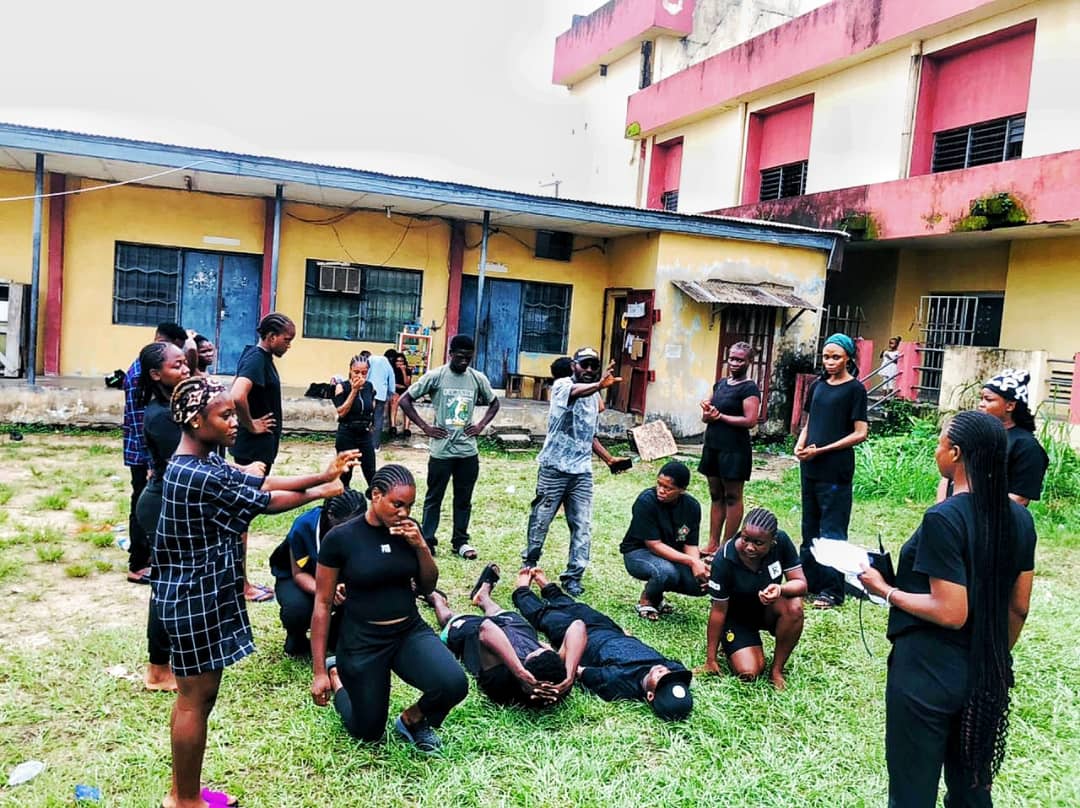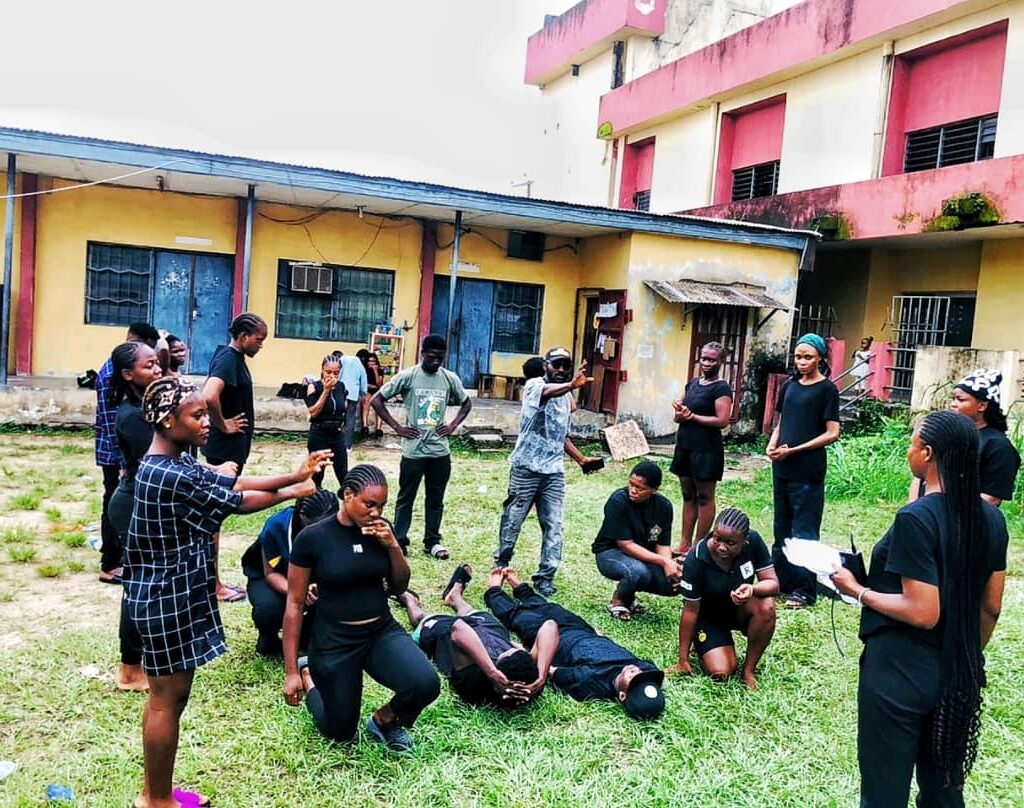Entertainment
Unical Theater Arts 2024 Play Festival, Focus On Soyinka’s ‘Death And The King’s Horseman’ As Directed By Awade Jacob

Nigerian Theatre boasts a rich and diverse history that is deeply rooted in the cultural heritage of its people. It has evolved from traditional performances otherwise called Sacred Theatre to contemporary or popular productions, reflecting the dynamic nature of Nigerian society. Nigerian Theatre evolved from indigenous performances, rituals, and storytelling. These traditional forms laid the groundwork for modern theatrical expressions.

However, colonialism had Western theatrical influences on Nigeria as it saw the establishment of schools and institutions that promoted drama and performance. The Colonial era also gave rise to proliferation of ideological suasions with many “Isms” including Realism, Naturalism, Farcism, Futurism, Romanticism, Surrealism, modernism of Theatre spaces, excessive expressivity and experimentations among others.
Despite foreign influence, Nigerian Theatre retained it originality further spotlighting her in the world literary map.
Nigerian playwrights on their part began to incorporate elements of Western theatre into their works, creating a unique blend of traditional and Western styles.
Playwrights like Wole Soyinka and Hubert Ogunde emerged as prominent figures, using theatre to address socioeconomic, political and moral issues in the society.
This trajectory continues with contemporary theatre tackling issues such as corruption, gender inequality, social vices and human rights.
Therefore, our literary appreciation of Nigerian Theatre focuses on Wole Soyinka’s ‘Death And The King’s Horseman.
Premiering in 1975, Death and the King’s Horseman is a play written by Nigerian Nobel laureate, Wole Soyinka.
The play is set in Oyo State, Nigeria, during World War II and tells the story of Elesin Oba, the King’s horseman who must die by ritual suicide after the Yoruba King dies.
Plot Progression
‘Death and the King’s Horseman’ opens in a typical Yoruba market.
A month has passed since the King’s death, and the time has come for Elesin Oba, the king’s horseman to follow his master to the afterlife.
Note, according to Yoruba tradition, the King’s Dog, Horse, and Horseman must die with the King to help him travel to the afterlife and avoid disrupting course of the universe.
In the market, Elesin Oba exchanges words with the Praise-Singers, assuring that he will complete the ritual as a group of women gathers to dress him for the ceremony. They sing the Horseman’s praises, remarking on what an honorable man he is, while Elesin relishes the attention.
However, the Horseman is soon distracted by the appearance of a beautiful Maiden. He sought consent of Iyaloja, “Mother” of the market who the young Maiden is, hoping to marry and impregnate before he dies to continue the circle of life.
Iyaloja is hesitant to grant his wish on grounds that said Maiden is betrothed to her son.
Given that Elesin will soon make a great sacrifice for the good of community, Iyaloja worries that upsetting him will undermine the ritual.
Reluctantly, she agrees to give him the Maiden on the condition that Elesin must complete his duties to the King and Yoruba tradition.
Thereafter, action shifts to the home of district Officer, Simon Pilkings. Pilkings and his wife, Jane, are dressed for a party when Amusa, a Yoruba police Officer interrupts them. Amusa informs Pilkings about Elesin’s intention to die by suicide.
Pilkings being alien to the Yoruba tradition of ritual suicide decides that the ritual must be stopped.
He sends Amusa away to arrest Elesin as he and his wife, Jane leaves for the ball. Amusa attempts to stop the ritual is thwarted by a group of market women who blocks his way and his other officers. He is forced to turn away, and Elesin, having consummated his marriage to the Maiden, begins dancing and falling into a trance.
Worried about a potential riot that may erupt at the instance of the British Prince, Pilkings heads off to the market to stop the ceremony himself.
While he is gone, Elesin’s son, Olunde, appears and begins talking with Jane.
Recall that Pilkings assisted Olunde attend medical school in England. Olunde on hearing about the Yoruba King’s demise returned immediately to be present at Elesin’s funeral. Jane on the flip side is horrified by Olunde’s calm acceptance of his father’s fate despite exposure to Western civilization.
As the beat of drums from the market changes to a dirge, Olunde is sure his father is dead. He asks Jane to excuse him and begins to leave. However, Pilkings arrives and stops Olunde.
The ritual has been prevented, and Elesin is still alive.
Angered by such cowardice, Olunde shames his father for not fulfilling his duty and accuses him of eating “left–overs.”
Pilking locks Elesin in a cell and watches over him, determined that he will survive the night. Iyaloja comes grudgingly telling Elesin she has brought him a “Gift” as a group of women enters with a large object swathed in cloth. She reveals the body of Olunde, who died by ritual suicide in his father’s stead to restore order to the universe and honor to his family. At the sight of his son’s body, Elesin strangles himself with his own chains and dies before the guards could stop him.
Central Theme of ‘Death And The King’s Horseman’.
Death is a central theme of the play as demonstrated in the title of the play, which refers to a Yoruba custom of a ritual sacrifice that must happen one month after the King’s death, wherein the King’s Horseman becomes honour-bound to commit ritual suicide and follow the King to the afterlife with a view to avert looming cataclysm.
Another striking theme in the play is ‘Power and Influence’. In this light,
Soyinka explores themes of power by illustrating dynamics between those who have power and those who do not.
The play particularly depicts imbalances of power between men and women, native peoples and foreign rulers, leaders and subordinates.
Soyinka draws attention to the way power imbalances can influence events with disastrous consequences.
Additionally, the playwright explored the theme of gender equality using women as conductor for attraction of positive vibration to Oyo Kingdom, setting of the Play.
Through the vociferous demonstrations of Iyaloja, the market women and Maiden, the cataclysm that would have befallen Oyo Kingdom should Elesin Oba fail to commit the ritual sacrifice was averted with Olunde devotion to ancestral norms. Their actions adds a layer to the superiority of the Yoruba cosmology over foreign cultures as represented by Pilkins and Jane.
Culture and religion are key ideas examined in ‘Death and the King’s Horseman’. Soyinka sets his play in a village with diverse religious beliefs and traditions to explore intolerance and prejudice specifically related to religious and cultural beliefs.
Equally worth noting is the place of Duty and responsibility.
‘Death and the King’s Horseman’ closely examines the idea of an individual’s personal duty and responsibility to community.
Soyinka’s main characters, from two different cultures, both deny their duties, and this raises questions about the human instinct for self-preservation.
In a nutshell, Nigerian Theatre is a vibrant and dynamic field with deep historical roots. Its evolution from traditional performances to contemporary productions reflects the resilience and creativity of the Nigerian people.
By understanding its origins and evolution, we can appreciate the cultural richness of Nigeria and support the continued growth of its Theatre industry.
Based on this pedagogy, as the University of Calabar Department of Theatre and Media Studies set to parade her 2024 Festival of Plays, Director, Awade Jacob, cast and crew with penchant for excellence leverages on their poetic license to constructively deconstruct this play text of reference (Death And The King’s Horseman) retaining it thematic ingredients.
Come 25 July, 2024 at the New Arts Theatre (NAT), University of Calabar, your traditional African aesthetics with a blend of contemporary elements shall resonate theatre in it original form with all hands on deck to keep you informed, educated and entertained.







